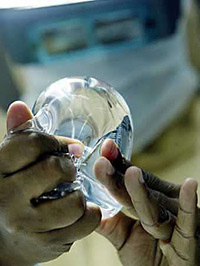 |
 |
 |
 Health & Beauty | July 2005 Health & Beauty | July 2005  
Silicone Breast Implants Get FDA OK
 Susan Heavey - Reuters Susan Heavey - Reuters


| | Studies have failed to find a connection between silicone implants and chronic diseases. |
Silicone gel-filled breast implants won conditional approval to return to the broad U.S. market after a 13-year ban when health officials on Thursday backed a version made by Mentor Corp.

The U.S. Food and Drug Administration said the device maker must satisfy a number of conditions before it receives final approval to sell the implants. FDA officials said they were legally prohibited from making the conditions public.

Mentor said the conditions were "generally consistent" with recommendations from an FDA advisory panel earlier this year.

In April, the expert panelists voted 7-2 to recommend approval of Mentor's silicone implants, but called for the company to monitor some women for rupture over 10 years as well as educate patients and doctors.

The FDA said its decision "does not mean that the device is approved for marketing in the United States at this time."

Critics of the implants, banned for most women since 1992 amid allegations that leaking silicone caused disabling, long-term illnesses, were hopeful the FDA would require more safety information before making a final decision.

"FDA can still do the right thing," Sybil Goldrich, head of the patient group the Command Trust Network.

The U.S. Senate health committee is investigating the FDA's handling of the decision, citing complaints about a conflict of interest among some FDA advisers. Other critics called for the FDA to delay a final decision pending the probe's conclusion.

Studies have failed to find a connection between silicone implants and chronic diseases. Researchers have linked the devices to pain and other local complications, and manufacturers admit the implants can break and require replacement.

Only U.S. women who need reconstruction surgery after breast cancer, have a physical deformity, or need a replacement after other implants ruptured have had access to silicone implants as part of special clinical studies.

Many women and plastic surgeons say silicone implants, which are available in Europe, look and feel more natural than saline-filled ones.

"I think women, with their physicians, can make informed decisions," said Betsy Mullen of the Women's Information Network Against Breast Cancer. | 
 | |
 |



